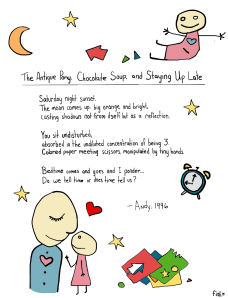Back in the late summer of 1996, my older daughter, Chloe, age three, and I were home, just the two of us on a Saturday night. My wife and Chloe’s mom, Melinda (who was pregnant with our younger daughter, Ella, at the time), had gone out with some friends. Together, Chloe and I made ourselves a casual dinner and now, the dishes cleaned up, it was nearing her bedtime.
 At Chloe’s request, I had gotten out the art supplies and she was busy coloring, cutting paper, painting, and whatever else struck her artistic fancy at three-years-old. I was taken by the seriousness with which she was engaged, although it also struck me that part of her seriousness was to keep herself busy so maybe she would get to stay up past her bedtime. Watching her, all of these things kind of converged in my mind and this idea of who controls time came to me.
At Chloe’s request, I had gotten out the art supplies and she was busy coloring, cutting paper, painting, and whatever else struck her artistic fancy at three-years-old. I was taken by the seriousness with which she was engaged, although it also struck me that part of her seriousness was to keep herself busy so maybe she would get to stay up past her bedtime. Watching her, all of these things kind of converged in my mind and this idea of who controls time came to me.
We use the expression “learn to tell time” to refer to being able to read a clock. But I had the inspiration that there was another meaning for that expression, that if we tried, we might want “to tell time” to ease up on us. I mean it’s Saturday night, your lovely little three-year-old is engaged in an art project. Do you really need to put her to bed because the clock says it’s 8pm? Who’s telling who what to do?
Do we tell time or does time tell us?
I made note of that expression and let Chloe stay up past her bedtime. After finally putting her to bed, I wrote a poem that ended with that line and referenced the evening we had had together. Over the next nearly 20 years, the poem was stashed in a binder where I kept things like it, songs, poems, ideas. Soon before Chloe graduated from college in 2015, I came across it while sifting through the binder in one of my frequent forays down memory lane. I asked an artist friend (Fish Astronaut) to illustrate the poem, and I presented the hand-printed illustrated version to her as a graduation gift (click on the image above, that’s it, to see it enlarged and read the original poem).
In the ensuing nine years, the poem would find its way back into my mind. Or, more accurately, the idea of being the master of my time or time being the master of me would find its way back into my mind. The concept of mindfulness, Eckhart Tolle’s book “The Power of Now,” and even expressions like “there’s no time like the present” would rattle around.
One night not loo long ago, I decided to see if I could make the poem into a song lyric, a song that would make the point about being the master of our time rather than the other way around with an added implication that maybe we could all learn something from little kids. The rewrite came fairly easily. Then this month, April of 2024, after I discovered the Suno AI music generator, I inputted my song lyric and the prompt “An eastern European gypsy punk ballad with accordion and power chords, sung fast.” The song here is the result. For the music video, I added pictures of Chloe from in and around the time she was three.
Postscript – I’ve named the “band” performing this song “Recteur Schmitt” for reasons I will explain at a different time. For now, understand that Recteur Schmitt is the name of one of the stops on Line 2 of the tramway in Nantes, France. Find an entire album of Recteur Schmitt songs on the usual platforms – Spotify, Amazon Music & Apple Music. If you want to buy a copy of the album for $1.00, go to Bandcamp and know you will have made my day.
DOES TIME TELL US?
Saturday night sunset, the moon comes up – big, orange and bright.
Too late for being on time, too early for saying goodnight.
You sit undisturbed, absorbed in the concentration of being three.
Your bedtime comes and goes, now what becomes of me?
What do we know, what is the fuss?
Do we tell time or does time tell us?
What do we know, what is the fuss?
Do we tell time or does time tell us?
I buried a wish in the sandbox when I was eight.
And lost more than my friends when they could not relate.
Now I hold your tiny hand and I’m back in the right place,
I thank the clock each time I see your face.
What do we know, what is the fuss?
Do we tell time or does time tell us?
What do we know, what is the fuss?
Do we tell time or does time tell us?
They mismanage the time they save for themselves,
while little kids listen for fire trucks, fairies, and elves.
You and me, we are the secret no one understands,
colored paper meeting scissors, manipulated by little hands.
Hour glasses to measure time, alarm clocks to wake us up.
Too much sand is passing through while morning is too abrupt.
Saturday night sunset, the moon comes up – big, orange and bright.
Too late for being on time, too early for saying goodnight.
What do we know, what is the fuss?
Do we tell time or does time tell us?
What do we know, what is the fuss?
Do we tell time or does time tell us?








 What’s important is to recognize that we are being tapped and to practice focusing our attention. In other words, I have the responsibility to do the physical and mental work, to turn and look, so to speak.
What’s important is to recognize that we are being tapped and to practice focusing our attention. In other words, I have the responsibility to do the physical and mental work, to turn and look, so to speak.




